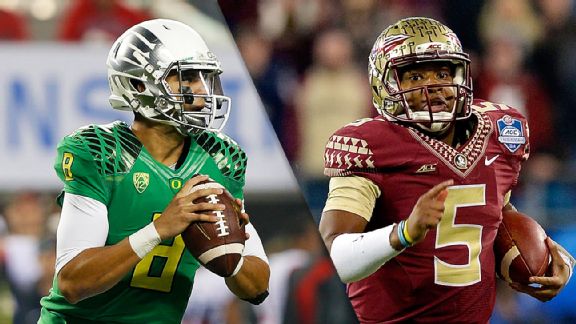So the title of this article may be slightly misleading, but it is meant to make a point. Obviously, in a game, an interception is far worse than a sack, but when it comes to evaluation, a lot of times those sacks show more negativity about a prospect than an interception would. Stats in football are still in its early stages, and although they get better every year, I still favor the scouting side of the game over anything that numbers may tell me. That is why I would likely feel more comfortable taking a quarterback with issues with turnovers than one who has issues taking sacks.
Don't get me wrong; interceptions are bad, and they are often worrisome. But a lot of times, these turnovers can be explained away. If you see a quarterback try to force a ball in, it could mean that he has trouble reading defenses, but it could mean that he is confident in his abilities to squeeze a ball in there. The best way to learn is by making mistakes, and if a quarterback can learn from throwing interceptions, it can serve as a valuable lesson as opposed to a reason to dock a player. I'm not trying to go as far as saying interceptions are a good thing; I just want to point out that they are not nearly as bad as people have made them out to be.
The problem with sacks is that they often show a lack of awareness. Some sacks can be explained by poor offensive line play, others can be explained by well-executed blitzes, but even in the most extreme circumstances, they can never explain away all the sacks. Pocket awareness is incredibly important for a quarterback to be successful. If the first option isn't open, it means that a quarterback may have to maneuver the pocket to buy some additional time to find that open receiver. If he can't do that, it is incredibly unlikely he can have a successful NFL career.
In evaluation, stats are a news article, and scouting is the editorial. You can learn what happened from the stats, but you can't possibly know the reasons or the future impact without the scouting. Sacks and interceptions are both bad, but just because interceptions are worse during a game doesn't mean they are worse for a quarterback's future.
Don't get me wrong; interceptions are bad, and they are often worrisome. But a lot of times, these turnovers can be explained away. If you see a quarterback try to force a ball in, it could mean that he has trouble reading defenses, but it could mean that he is confident in his abilities to squeeze a ball in there. The best way to learn is by making mistakes, and if a quarterback can learn from throwing interceptions, it can serve as a valuable lesson as opposed to a reason to dock a player. I'm not trying to go as far as saying interceptions are a good thing; I just want to point out that they are not nearly as bad as people have made them out to be.
The problem with sacks is that they often show a lack of awareness. Some sacks can be explained by poor offensive line play, others can be explained by well-executed blitzes, but even in the most extreme circumstances, they can never explain away all the sacks. Pocket awareness is incredibly important for a quarterback to be successful. If the first option isn't open, it means that a quarterback may have to maneuver the pocket to buy some additional time to find that open receiver. If he can't do that, it is incredibly unlikely he can have a successful NFL career.
In evaluation, stats are a news article, and scouting is the editorial. You can learn what happened from the stats, but you can't possibly know the reasons or the future impact without the scouting. Sacks and interceptions are both bad, but just because interceptions are worse during a game doesn't mean they are worse for a quarterback's future.

No comments:
Post a Comment